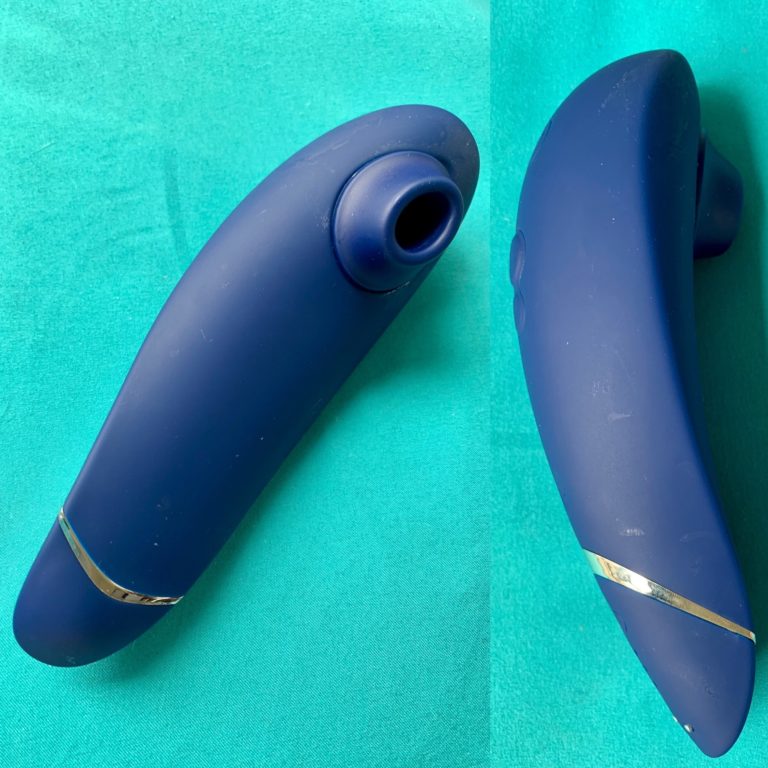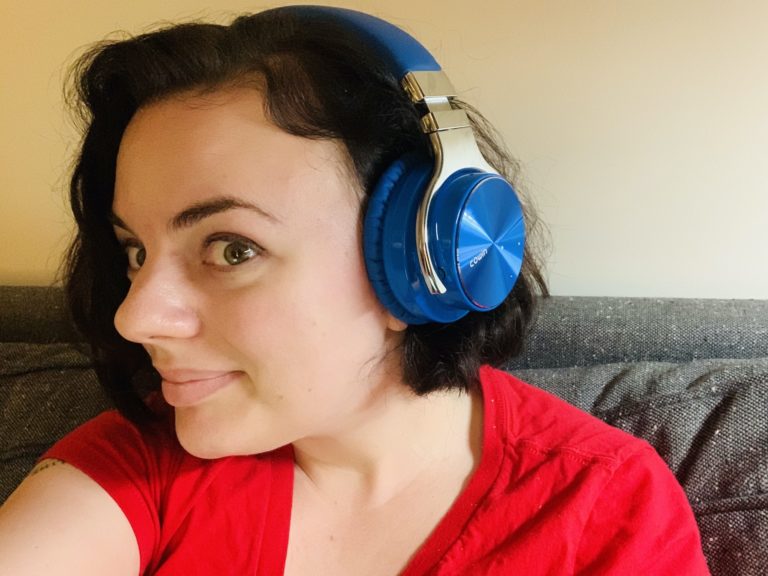
If toys like the Womanizer are meant to replicate cunnilingus – which is a subject of some debate in the industry – then I don’t think the technology is quite there yet. However, the luxe Womanizer Premium is one of the better options in its category, due to a number of innovations it introduces, even if it doesn’t quite scratch the right itch when I’m craving oral sex.
The folks at Lovehoney let me pick a toy to review for them, and I asked for the Womanizer Premium because I’ve had my eye on it ever since it launched. Available in a sophisticated navy blue (which I chose) amongst other shades, and boasting a sleek, ergonomic shape, this is certainly one of the most aesthetically pleasing Womanizers out there. (That may not be saying much, considering that the first Womanizer was leopard-print and rhinestoned, but still.) At $200, it’s one of the priciest pressure-wave toys I’ve ever seen – and aesthetically, I can see how it’s worthy of that price point. But what about how it actually feels?
Admittedly, a different toy – the Lelo Sila – instantly became my favorite pressure-wave toy when I first tried it, and it has remained so, for one key reason: its nozzle (or “mouth,” if you prefer) is big enough to stimulate my entire clitoral shaft, instead of just the hyper-sensitive tip of my clit. I have yet to find ANY other toy that does this, and I must have tried dozens at this point. (The closest I’ve found so far is the Satisfyer Curvy 2, which I would recommend if you want clit shaft stimulation but can’t afford Lelo’s pricey wares.) I don’t even have a particularly big clit, but most pressure-wave toys’ nozzles (including that of the Womanizer Premium) feel too small for my purposes, because I don’t want a ton of stimulation focused on the head of my clit. I know I’m not alone in this, because readers of mine have expressed similar sentiments. Why are more companies not meeting this need?
The Womanizer Premium even comes with two different nozzles, so you can theoretically swap between them for different sensations – but for me, they feel pretty much identical, and neither of them does the thing I actually want this type of toy to be able to do. The pressure waves in this one are on the rumblier side, so they do stimulate my internal clit to some extent, even if indirectly – but I still miss the way the Sila basically deepthroats my clit, rumbling its whole external length through my clitoral hood and inner labia.
But that’s a matter of personal taste. People who like direct, pinpoint clit stimulation would likely enjoy this toy, because it’s well-made and highly intuitive. It has 12 different intensity levels; I usually stay within the first 3-4 because they are plenty powerful enough for me. It also has a much-talked-about “autopilot mode” which allows you to lie back and let the toy decide when to change the intensity. As my friend Rae noted in their review, this mode feels much more like having actual partnered sex than a lot of other sex toys do. Unlike standard vibration patterns, the Womanizer’s autopilot mode takes its sweet time, transitioning smoothly between intensities like a partner who is paying attention to the hills and valleys of your sexual response. That said, the Womanizer isn’t actually paying attention to your body in that way, so sometimes this mode gets out of step with where I actually am in my arousal process. When that happens, though, I can just hit one button and I’ll be back in the standard choose-your-own-speed mode.
The buttons are one of the best things about this toy, actually. Specifically, the “+” button. Although the controls are positioned on the back of the toy where they can be hard to see during use, the “+” and “–” buttons are raised, and are noticeably different sizes from one another, so I can always turn the toy’s intensity up in a hurry when I need to, even in the dark. I love this feature!
I like that this Womanizer is shaped well for hands-free usage. In fact, as I write this, it is currently sandwiched between my thighs, and is maintaining a good seal around my clit without requiring much thigh pressure. I like to use it this way while I’m watching porn or reading erotica, especially in the bath (it’s waterproof), where being underwater seems to intensify the suction created by the air waves.
The “Smart Silence” feature first used in We-Vibe toys has been employed here too. It causes the toy to temporarily turn off whenever you lift it away from your body, resuming its stimulation once you press it to your clit again. I thought this feature would be annoying and finicky as it is in some We-Vibe toys, but they seem to have fixed it in the Womanizer Premium; it doesn’t tend to turn off when I want it to be on, though it occasionally does turn on when I want it to be off (such as when its nozzle brushes against the bedsheets when I set it aside for a moment to adjust my pillows or pick a different porn clip). You can also turn off this feature if you prefer. I’ve left it on, because I like that it saves battery power and also renders the toy nearly silent, since – as with most pressure-wave toys, and indeed most people – this one makes noise when there’s nothing in its “mouth” but quiets down significantly once it’s put to use.
The Womanizer Premium is shaped in such a way that it’d work great during PIV/intercourse. It’s flat-ish and ergonomic, and thus fits between bodies comfortably. However, the tip of the toy does extend a little over an inch past the end of the nozzle, which – depending on the distance between your clit and your vaginal opening – might be enough to make penetration difficult. I would likely reach for a more petite toy if I wanted pressure waves on my clit during PIV.
The Premium charges magnetically, is fully waterproof, and comes with a 5-year warranty. It’s perhaps the fanciest, nicest pressure-wave toy I’ve ever tried – but the size of its nozzle makes it not-quite-perfect for my body, because it does the clitoral equivalent of flicking a tongue against the head of a penis while forgetting that the shaft and balls exist. But hey, if you’re into that, you’d probably dig this gorgeous (albeit expensive) pleasure object.
Thanks to Lovehoney for sending me the Womanizer Premium to review!

 Ever since I
Ever since I 
